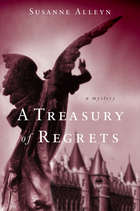Bookstore
HISTORICAL/WHODUNIT/
POLICE PROCEDURAL MYSTERY
POLICE PROCEDURAL MYSTERY
a treasury of regrets
On Library Journal's list of the best genre fiction of 2007
Read A Review:
In the aftermath of so much death and destruction, postrevolutionary Paris struggles to recover, but people are poor, food is scarce, and freelance police investigator Aristide Ravel (Game of Patience) finds work where he can. At the house of wealthy Martin Dupont, Ravel must sort out the reason someone poisoned the family dinner, an act that led to Monsieur Dupont's demise. The Duponts all have reasons to hate the senior Dupont, but the police have arrested illiterate servant girl Jeannette Moineau in the face of what appears to be overwhelming evidence of her guilt. Alleyn skillfully depicts her characters' flaws and strengths while plotting a fine puzzle mystery. If your patrons enjoy historicals and have not yet discovered Alleyn, put her latest on the must-read list.
Library Journal (starred review)
The chaotic days following the French Revolution form the backdrop for this absorbing sequel to 2006's Game of Patience, Alleyn's third novel, in which police spy Aristide Ravel and Commissaire Brasseur explore the various motives and opportunities of the Dupont family after their patriarch is poisoned. The late Monsieur Dupont's widowed daughter-in-law enlists the two Paris policemen when the family's servant girl, Jeannette Moineau, is accused of the poisoning--a charge Mademoiselle Dupont considers absurd. The investigation moves forward, but another death soon follows. With a light, literate hand, Alleyn includes a wealth of detail about life in France during the Republican period, while ratcheting up the tension with every chapter. Fans of Charles O'Brien (Mute Witness) and Baroness Orczy (The Scarlet Pimpernel) will be delighted.
Publishers Weekly
The arrest of a Paris kitchen maid, for the poisoning of wealthy Martin Dupont, owner of the house where she works, is the simple yet effective introduction to Susanne Alleyn's A Treasury of Regrets, an 18th-century mystery embellished by the drama of France's tumultuous post-revolution years. In a society still shadowed by the guillotine and haunted by its victims, mundane crime and punishment remain an issue.
Aristide Ravel is cast as a forerunner of the 20th century's laconic and lachrymose detective, a freelance investigator for the Paris police who finds that the poisoning of Dupont is rooted in a family's resentment and revenge, complicated by an intricate mesh of relationships upstairs and downstairs.
Ms. Alleyn skillfully portrays a household of suspects where crimes multiply while the unfortunate and innocent servant girl lies in a squalid jail cell. In the course of an investigation that takes him into hidden and forbidden corners of Parisian society, Ravel has to cope with revelations of his own past, and he is forced to relive the horror of the days when thousands of heads fell to the guillotine.
The author captures the atmosphere of a nation struggling toward a social and political unity untainted by the irrational violence and cruelty of those who toppled the monarchy. Ravel is a realistic and appealing observer of a developing society.
The Washington Times
In the aftermath of so much death and destruction, postrevolutionary Paris struggles to recover, but people are poor, food is scarce, and freelance police investigator Aristide Ravel (Game of Patience) finds work where he can. At the house of wealthy Martin Dupont, Ravel must sort out the reason someone poisoned the family dinner, an act that led to Monsieur Dupont's demise. The Duponts all have reasons to hate the senior Dupont, but the police have arrested illiterate servant girl Jeannette Moineau in the face of what appears to be overwhelming evidence of her guilt. Alleyn skillfully depicts her characters' flaws and strengths while plotting a fine puzzle mystery. If your patrons enjoy historicals and have not yet discovered Alleyn, put her latest on the must-read list.
Library Journal (starred review)
The chaotic days following the French Revolution form the backdrop for this absorbing sequel to 2006's Game of Patience, Alleyn's third novel, in which police spy Aristide Ravel and Commissaire Brasseur explore the various motives and opportunities of the Dupont family after their patriarch is poisoned. The late Monsieur Dupont's widowed daughter-in-law enlists the two Paris policemen when the family's servant girl, Jeannette Moineau, is accused of the poisoning--a charge Mademoiselle Dupont considers absurd. The investigation moves forward, but another death soon follows. With a light, literate hand, Alleyn includes a wealth of detail about life in France during the Republican period, while ratcheting up the tension with every chapter. Fans of Charles O'Brien (Mute Witness) and Baroness Orczy (The Scarlet Pimpernel) will be delighted.
Publishers Weekly
The arrest of a Paris kitchen maid, for the poisoning of wealthy Martin Dupont, owner of the house where she works, is the simple yet effective introduction to Susanne Alleyn's A Treasury of Regrets, an 18th-century mystery embellished by the drama of France's tumultuous post-revolution years. In a society still shadowed by the guillotine and haunted by its victims, mundane crime and punishment remain an issue.
Aristide Ravel is cast as a forerunner of the 20th century's laconic and lachrymose detective, a freelance investigator for the Paris police who finds that the poisoning of Dupont is rooted in a family's resentment and revenge, complicated by an intricate mesh of relationships upstairs and downstairs.
Ms. Alleyn skillfully portrays a household of suspects where crimes multiply while the unfortunate and innocent servant girl lies in a squalid jail cell. In the course of an investigation that takes him into hidden and forbidden corners of Parisian society, Ravel has to cope with revelations of his own past, and he is forced to relive the horror of the days when thousands of heads fell to the guillotine.
The author captures the atmosphere of a nation struggling toward a social and political unity untainted by the irrational violence and cruelty of those who toppled the monarchy. Ravel is a realistic and appealing observer of a developing society.
The Washington Times

